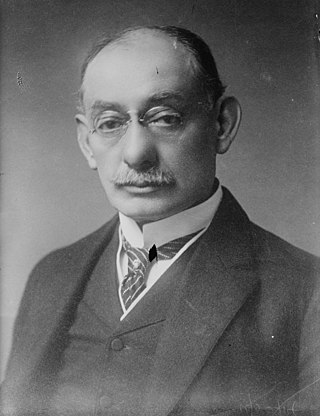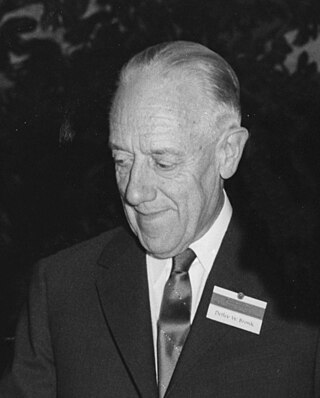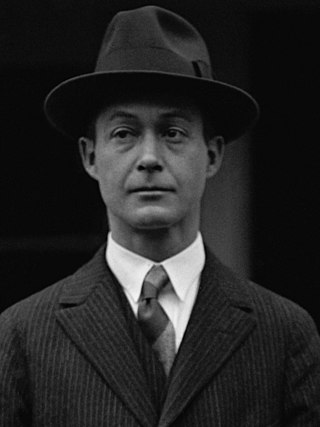Related Research Articles
John DeFrancis was an American linguist, sinologist, author of Chinese language textbooks, lexicographer of Chinese dictionaries, and Professor Emeritus of Chinese Studies at the University of Hawaiʻi at Mānoa.

Patrick Anthony McCarran was an American farmer, attorney, judge, and Democratic politician who represented Nevada in the United States Senate from 1933 until 1954.

Owen Lattimore was an American Orientalist and writer. He was an influential scholar of China and Central Asia, especially Mongolia. Although he never earned a college degree, in the 1930s he was editor of Pacific Affairs, a journal published by the Institute of Pacific Relations, and then taught at Johns Hopkins University in Baltimore, Maryland, from 1938 to 1963. He was director of the Walter Hines Page School of International Relations there from 1939 to 1953. During World War II, he was an advisor to Chiang Kai-shek and the American government and contributed extensively to the public debate on American policy in Asia. From 1963 to 1970, Lattimore was the first Professor of Chinese Studies at the University of Leeds in England.

The Paul H. Nitze School of Advanced International Studies (SAIS) is a graduate school of Johns Hopkins University based in Washington, D.C. with campuses in Bologna, Italy and Nanjing, China.

Walter Hines Page was an American journalist, publisher, and diplomat. He was the United States ambassador to Great Britain during World War I. After World War I broke out in 1914 Page was so enthusiastically in favor of Britain during the period of American neutrality that Wilson and other top officials increasingly discounted his views. Page was instrumental in negotiating the sale of American war materials, including munitions, food and supplies, to the British, helping to ensure that it had the resources it needed to continue the fight against Germany.
The Institute of Pacific Relations (IPR) was an international NGO established in 1925 to provide a forum for discussion of problems and relations between nations of the Pacific Rim. The International Secretariat, the center of most IPR activity over the years, consisted of professional staff members who recommended policy to the Pacific Council and administered the international program. The various national councils were responsible for national, regional and local programming. Most participants were members of the business and academic communities in their respective countries. Funding came largely from businesses and philanthropies, especially the Rockefeller Foundation. IPR international headquarters were in Honolulu until the early 1930s when they were moved to New York and the American Council emerged as the dominant national council.

Hillhead High School is a day school in Glasgow, Scotland, on Oakfield Avenue, neighbouring the University of Glasgow.

Louis Francis Budenz was an American activist and writer. He began as a labor activist and became a member of the Communist Party USA. In 1945, Budenz renounced Communism and became a vocal anti-Communist, appearing as an expert witness at governmental hearings and writing about his experiences.

Frank Johnson Goodnow was an American educator and legal scholar. He was the first president of the American Political Science Association. He was an elected member of both the American Academy of Arts and Sciences and the American Philosophical Society.
Lowell Jacob Reed was 7th president of the Johns Hopkins University in Baltimore, Maryland. He was born in Berlin, New Hampshire, the son of Jason Reed, a millwright and farmer, and Louella Coffin Reed.
The Johns Hopkins University SAIS Europe in Bologna, Italy, is the European campus of the Paul H. Nitze School of Advanced International Studies (SAIS), a division of Johns Hopkins University located in Washington, D.C. SAIS degree programs emphasize international economics, international relations, EU policy and global risk with options to specialize in a broad range of other policy areas and geographic regions.

Detlev Wulf Bronk was a prominent American scientist, educator, and administrator. He is credited with establishing biophysics as a recognized discipline. Bronk served as president of Johns Hopkins University from 1949 to 1953 and as president of The Rockefeller University from 1953 to 1968. Bronk also held the presidency of the National Academy of Sciences between 1950 and 1962.
Edith Elura Tilton Penrose was an American-born British economist whose best known work is The Theory of the Growth of the Firm, which describes the ways which firms grow and how fast they do. Writing in The Independent, the economist Sir Alec Cairncross stated that the book brought Dr. Penrose "instant recognition as a creative thinker, and its importance to the analysis of the job of management has been increasingly realized".

Helmut Sonnenfeldt, also known as Hal Sonnenfeldt, was an American foreign policy expert. He was known as Kissinger’s Kissinger for his philosophical affinity with and influence on Henry A. Kissinger, the architect of American foreign policy in the Nixon and Ford administrations.
Steven R. David is Professor of International Relations at Johns Hopkins University. He specializes in international politics and security issues.
In American political discourse, the "loss of China" is the unexpected Chinese Communist Party coming to power in mainland China from the U.S.-backed Chinese Kuomintang government in 1949 and therefore the "loss of China to communism."

John Van Antwerp MacMurray was an American attorney, author and diplomat best known as one of the leading China experts in the U.S. government. He served as Assistant Secretary of State from November 1924 to May 1925, and was subsequently appointed Minister to China in 1925. Although MacMurray had coveted the China post, he soon fell into disagreement with the State Department over U.S. policy towards the ruling Kuomintang government. He resigned the position in 1929 and briefly left the foreign service. Following several years in academia, MacMurray returned to the State Department to become Minister to Estonia, Latvia and Lithuania from 1933 to 1936. He later served as ambassador to Turkey from 1936 to 1941, and then was made a special assistant to the Secretary of State until his retirement in 1944.

Ji Chaoding was a Chinese economist and political activist. His book Key Economic Areas in Chinese History (1936) influenced the conceptualization of Chinese history in Europe by emphasizing geographic and economic factors as the basis of dynastic power.

Philip Jacob Jaffe was a left-wing American businessman, editor and author. He was born in Ukraine and moved to New York City as a child. He became the owner of a profitable greeting card company. In the 1930s Jaffe became interested in Communism and edited two journals associated with the Communist Party USA. He is known for the 1945 Amerasia affair, in which the FBI found classified documents in the offices of his Amerasia magazine that had been given to him by State Department employee John S. Service. He received a minimal sentence due to OSS/FBI bungling of the investigation, but there were continued reviews of the affair by Congress into the 1950s. He later wrote about the rise and decline of the Communist Party in the USA.
Frederick Sherwood Dunn was an American scholar of international law and international relations. After working as a legal officer at the U.S. Department of State, he went into academia and taught at Johns Hopkins University, Yale University, and Princeton University, publishing several books during his career.
References
- 1 2 3 "MacMurray Explains Mission of Walter Hines Page School". The Sun. Baltimore. October 5, 1930. p. 5 – via Newspapers.com.
- 1 2 "Dawes' Nobel Prize a Gift to School". The New York Times. January 16, 1927. p. 68.
- 1 2 3 4 5 6 7 "J. H. U.'s Page School Directed by Lattimore Will Be Discontinued". The Sun. Baltimore. April 17, 1953. pp. 38, 24 – via Newspapers.com.
- 1 2 3 4 5 6 7 "Page's School to Go at Johns Hopkins". The New York Times. April 17, 1953. p. 11.
- 1 2 3 4 5 6 7 8 9 10 Linebarger, Paul M. A. (1963). "Twenty SAIS Years, An Informal Memoir". SAIS Review. 8 (1): 4–40. JSTOR 45348230.
- ↑ "Admiral Sims Favors Walter Page School". The New York Times. May 11, 1924. p. 61.
- ↑ "Joseph S. Ames, '86, PhD '90, LLD '36". Johns Hopkins Alumni Magazine. June 1943.
- 1 2 Kuehl, Warren F. (1986). "Webs of Common Interests Revisited: Nationalism, Internationalism, and Historians of American Foreign Relations". Diplomatic History. 10 (2): 107–120. doi:10.1111/j.1467-7709.1986.tb00453.x. JSTOR 24911642.
- 1 2 3 Ekbladh, David (2011). "Present at the Creation: Edward Mead Earle and the Depression-Era Origins of Security Studies". International Security. 36 (3): 107–141. JSTOR 41428111.
- ↑ "Frederick Dunn of Princeton Dies". The New York Times. March 16, 1962. p. 86.
- 1 2 Pace, Eric (June 1, 1989). "Owen Lattimore, Far East Scholar Accused by McCarthy, Dies at 88". The New York Times. p. B8.
- 1 2 3 4 "Hopkins Adds International Study School". The Sun. Baltimore. September 10, 1950. pp. 38, 22 – via Newspapers.com.
- 1 2 McCormick, Charles H. (July–August 1994). "[Book Reviews]". Academe. 80 (4): 55 56. JSTOR 40250647.
- 1 2 Rimmington, Don (1998). "Book Reviews: An Example of the Impact of McCarthyism and the Cold War on the Administration of Universities". Minerva. 36 (1): 81–84. doi:10.1023/A:1004338622199. JSTOR 41821091. S2CID 141416956.
- ↑ Diamond, Sigmund (1995). "[Book Reviews]". Higher Education. 29 (2): 221–224. JSTOR 3447848.